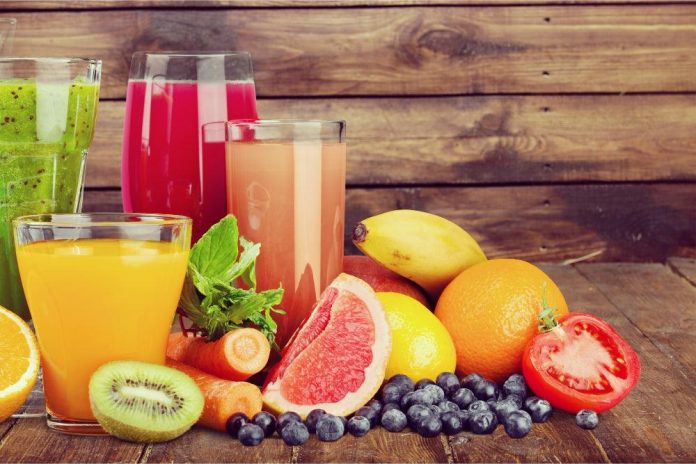The bottles are in your neighborhood health food store. I took note of the advertisements on your feed. Heard celebrities raving about losing ten pounds in a single week.
And now you’re thinking, perhaps I ought to give one of those juice fasts a try. Could that be the key to shedding pounds?
The truth? It’s not the finest strategy to lose weight using juice. Because juice cleanses for weight reduction are fraught with danger, despite the fact that juices may include a healthy number of vitamins and minerals that are beneficial to your body.
I spoke with registered dietitian Amber Sommer, RD, LD, about the issues surrounding weight loss through juice fasting.
Do juice cleanses work for weight loss?
When you experiment with a juice cleanse, you might initially drop some weight. However, it’s not how your body needs or wants it to be.
This is the reason.
Generally, a juice cleanse entails weaning off of solid meals and sticking to liquids made from freshly squeezed fruit and vegetables. A juice diet may be recommended by some for a few days or several weeks. Juicing is said to help “detoxify” your body and accelerate weight loss.
Nextmug – Temperature-Controlled, Self-Heating Coffee Mug (Black – 14 oz.)
However, there are many problems with the concept of a juice fast.
“You end up not consuming adequate nutrition when you swap out food for juice,” claims Sommer. You’re not consuming enough fiber, protein, or calories. Your metabolism may be slowed down as a result, which will not aid in weight loss. Additionally, it may have other detrimental effects like decreased energy, mental fog, and more. It’s not a sensible strategy for losing weight.
Sommer discusses the drawbacks of using juice to lose weight.
You’re not targeting fat loss
Energy is what your body needs to function. Convincing your body to burn fat cells for energy should be the aim of a good weight loss plan.
However, if you follow a juicing diet, your body will be more inclined to obtain energy from your muscle and water stores. Not fatty.
“The first weight loss that occurs during a juice fast is probably water weight,” advises Sommer. “And you’re probably going to start losing muscle over time.”
For what reason is that the case?
Your body first consumes any stored carbohydrates as fuel when it needs energy. Your cells store excess carbohydrates as glycogen. Consider glycogen to be the storage locker in your body.
When juice is consumed in place of an actual meal, your body runs out of carbohydrates rather quickly. Thus, it releases stored glycogen.
You also release water when you release glycogen.
That’s the weight you shed over the first few days of a juice fast, rapidly and effortlessly? It’s usually too much water draining from your system.
Your glycogen reserves gradually run out as time passes. Your body will be more prone to focus on robbing energy from muscle mass at that point. (Once more, not obese.)
“You need protein to shed weight. Fiber is necessary. You need complex carbohydrates. None of which you obtain when on a juice fast,” stresses Sommer. Your body then begins to draw energy from any available source.
Of course, the scale’s number could drop. But at the price of your general health and muscular tone. Not worthwhile.
Too much sugar
You can see how much juice goes into a single cup if you’ve ever made your own at home.
Consider orange juice as an example. It may take three to five oranges, depending on their size and the strength of your juicer, to produce eight ounces of juice.
You might be thinking, “Great,” all those orange benefits in one drink! Juice triumphs!
Not exactly.
That is a lot of oranges for most of us to eat in one sitting. Our consumption is inherently restricted. And that’s a positive aspect.
Because oranges have a high sugar content despite being a great source of vitamin C. Each orange has about 12 grams of sugar.
Now, not all of the natural sugar in an orange is absorbed by your bloodstream when you consume the entire fruit. This is as a result of the fiber in oranges. The problem is that the fiber is lost when you juice those oranges.
And that has a significant impact.
According to Sommer, sugar is absorbed by the body more quickly when there is no fiber present. Fiber aids in reducing the rate at which sugar is absorbed and digested. Thus, this aids in controlling hunger and blood sugar levels. Fruit reduces the amount of increase in blood sugar that occurs. It does when you consume fruit juice. And the reason for it is because you’re not receiving the fiber’s ability to slow things down.
Thus, you’ve had the sugar equivalent of three to five oranges in only one 8-ounce cup of orange juice. not to mention the fiber at all.
Sugar impedes weight loss efforts. It exits your system fast and doesn’t offer sustainable energy.
Juicing’s high fiber-free sugar content can therefore cause a sugar crash, leave you too exhausted to exercise, and leave you feeling peckish. Not exactly the best conditions for losing weight.
Calorie restriction
Fundamentally, losing weight is about burning more energy than you are consuming. We refer to that as a calorie deficit. However, weight loss juice cleanses push you to consume much too little energy.
A fantastic source of the vitamins, minerals, and antioxidants your body needs is juice. Therefore, if you’re concerned that your body isn’t receiving all the nutrients it needs, homemade juice may occasionally be a beneficial addition to your diet.
However, consuming juice at the price of your body’s necessary calorie intake? Not the best course of action.
The advocates of any diet that pushes you to drastically cut calories are not looking out for your health.
urthermore, you cannot sustain a severe calorie restriction over time. Therefore, any weight you lose by juicing is probably going to return as soon as you resume your more naturally occurring eating habits.
How to lose weight in a healthy way
Drinking juice instead of a balanced diet isn’t a healthy strategy, much like other fad diets that advise you to skip meals, exclude food groups, or drastically reduce your calorie intake.
Losing weight healthily entails maintaining your nutritional requirements.
“Eating natural, whole foods is the best way to lose weight,” according to Sommer, who advocates for a balanced diet. “You require enough fiber, healthy fats, protein, and calories.”
And it’s not just what you eat (and don’t eat). Set yourself up for weight loss success by also:
- Aiming for 150 minutes of exercise each week (or 30 minutes, five days per week).
- Getting enough sleep.
- Drinking plenty of water.
- Managing stress.
There are healthy methods to include juice in your diet, though, if you’re still dying to try that juicer. Key phrase: A component of your diet. Not everything in your diet.)
In order to have control over what goes into your cup, Sommer suggests preparing your own juice at home as opposed to purchasing it from the store.
To reduce the amount of sugar in your juice, choose a juice that is higher in vegetables than fruit. To keep it filling, go for a smoothie that has protein powder.
Nutrients that your body requires are naturally abundant in fruits and vegetables. However, pulverizing, sieving, and consuming them only eliminates a portion of their inherent health advantages. Remain detached from the frenzy surrounding juice cleanses. The solutions to long-term, healthful weight loss don’t come in pre-made bottles or beverages devoid of pulp and fiber.


























